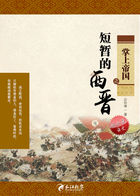On the second day of the festival, the twenty-third of March, the chief ceremony seems to have been a blowing of trumpets. The third day, the twenty-fourth of March, was known as the Day of Blood: the Archigallus or highpriest drew blood from his arms and presented it as an offering. Nor was he alone in making this bloody sacrifice. Stirred by the wild barbaric music of clashing cymbals, rumbling drums, droning horns, and screaming flutes, the inferior clergy whirled about in the dance with waggling heads and streaming hair, until, rapt into a frenzy of excitement and insensible to pain, they gashed their bodies with potsherds or slashed them with knives in order to bespatter the altar and the sacred tree with their flowing blood. The ghastly rite probably formed part of the mourning for Attis and may have been intended to strengthen him for the resurrection. The Australian aborigines cut themselves in like manner over the graves of their friends for the purpose, perhaps, of enabling them to be born again. Further, we may conjecture, though we are not expressly told, that it was on the same Day of Blood and for the same purpose that the novices sacrificed their virility. Wrought up to the highest pitch of religious excitement they dashed the severed portions of themselves against the image of the cruel goddess. These broken instruments of fertility were afterwards reverently wrapt up and buried in the earth or in subterranean chambers sacred to Cybele, where, like the offering of blood, they may have been deemed instrumental in recalling Attis to life and hastening the general resurrection of nature, which was then bursting into leaf and blossom in the vernal sunshine. Some confirmation of this conjecture is furnished by the savage story that the mother of Attis conceived by putting in her bosom a pomegranate sprung from the severed genitals of a man-monster named Agdestis, a sort of double of Attis.
If there is any truth in this conjectural explanation of the custom, we can readily understand why other Asiatic goddesses of fertility were served in like manner by eunuch priests. These feminine deities required to receive from their male ministers, who personated the divine lovers, the means of discharging their beneficent functions: they had themselves to be impregnated by the life-giving energy before they could transmit it to the world.
Goddesses thus ministered to by eunuch priests were the great Artemis of Ephesus and the great Syrian Astarte of Hierapolis, whose sanctuary, frequented by swarms of pilgrims and enriched by the offerings of Assyria and Babylonia, of Arabia and Phoenicia, was perhaps in the days of its glory the most popular in the East. Now the unsexed priests of this Syrian goddess resembled those of Cybele so closely that some people took them to be the same. And the mode in which they dedicated themselves to the religious life was similar. The greatest festival of the year at Hierapolis fell at the beginning of spring, when multitudes thronged to the sanctuary from Syria and the regions round about. While the flutes played, the drums beat, and the eunuch priests slashed themselves with knives, the religious excitement gradually spread like a wave among the crowd of onlookers, and many a one did that which he little thought to do when he came as a holiday spectator to the festival. For man after man, his veins throbbing with the music, his eyes fascinated by the sight of the streaming blood, flung his garments from him, leaped forth with a shout, and seizing one of the swords which stood ready for the purpose, castrated himself on the spot. Then he ran through the city, holding the bloody pieces in his hand, till he threw them into one of the houses which he passed in his mad career. The household thus honoured had to furnish him with a suit of female attire and female ornaments, which he wore for the rest of his life. When the tumult of emotion had subsided, and the man had come to himself again, the irrevocable sacrifice must often have been followed by passionate sorrow and lifelong regret. This revulsion of natural human feeling after the frenzies of a fanatical religion is powerfully depicted by Catullus in a celebrated poem.















